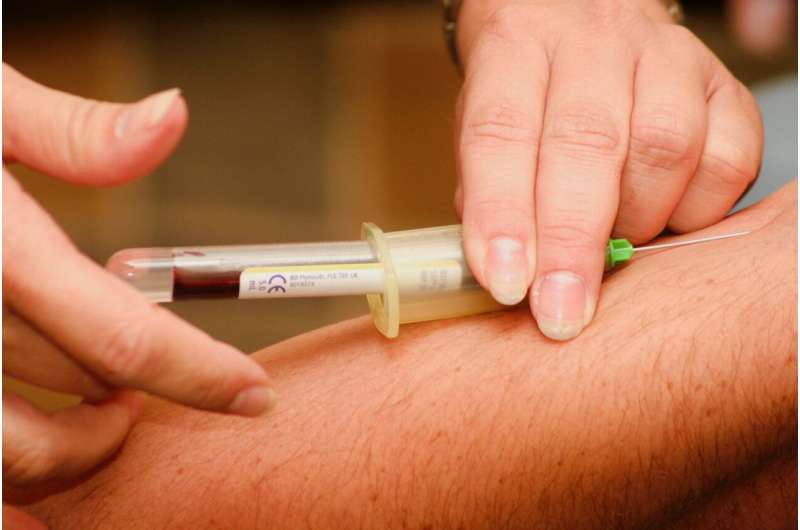This article has been reviewed according to Science X's editorial process and policies. Editors have highlighted the following attributes while ensuring the content's credibility:
fact-checked
peer-reviewed publication
trusted source
proofread
Blood test reveals which women are at higher risk of preeclampsia in the later stages of pregnancy

Preeclampsia is a severe complication of pregnancy, affecting one in 40 pregnant women. Identifying high-risk patients is often difficult and complex because the exact cause of preeclampsia is still unknown.
Researchers from KU Leuven found that a DNA analysis can tell which women are at higher risk of preeclampsia in the later stages of pregnancy. By detecting high-risk patients early, preventive medication can be administered, dramatically reducing the risk of severe preeclampsia. The study, "Cell-free DNA Methylome Analysis for Early Preeclampsia Prediction," appeared in Nature Medicine.
Preeclampsia is characterized by high blood pressure in the mother. If left untreated, preeclampsia can cause organ damage and, in rare cases, lead to the death of the mother or child. Preventing this from happening and lowering blood pressure can typically only be achieved by inducing delivery.
In one in eight cases, preeclampsia occurs early, with symptoms appearing between 20 and 34 weeks of pregnancy. Babies born before 34 weeks, for example because labor had to be induced, must be admitted to the neonatal intensive care unit and may develop serious complications.
Timely identification of women at increased risk of (early) preeclampsia is necessary to initiate appropriate and preventive treatment to reduce the risk of preeclampsia and possible premature birth.
Preventive treatment
The exact cause of preeclampsia remains unknown, which makes identifying high-risk patients difficult. Currently, screening tests are often unreliable, complex, and time-consuming. However, it is known that the placenta plays a crucial role. Therefore, researchers from KU Leuven, led by Professor Bernard Thienpont, set out to compare the placenta's DNA in 498 women with and without early preeclampsia.
"It is normal for the structure of the placenta's DNA to change during pregnancy, a process driven by 'DNA methylation,'" Professor Thienpont explains. "But we see a different pattern of DNA methylation in women who develop early preeclampsia. The cause of this difference is currently unknown, but it does allow us to identify women who are at increased risk and treat them even before symptoms appear."
Aspirin is currently the most effective treatment for preventing severe preeclampsia, reducing the risk by 60–80%. "It is believed that aspirin causes preeclampsia to occur later in pregnancy, thus delaying any premature birth," says researcher Marie De Borre, MD. "Especially in the final stage of pregnancy, a few weeks can make a real difference to a baby's development and health."
While aspirin is safe for pregnant women, it is not recommended to use it as a precaution against preeclampsia during every pregnancy.
Analysis along with the NIPT test
"A major advantage of our test is that it can be conducted on DNA obtained from a simple blood sample taken around the 12th week of pregnancy. In Belgium, that blood sample is taken frequently anyway for the NIPT test in order to detect fetal chromosomal abnormalities. So we do not need to take additional samples or cells from the placenta itself," Thienpont explains.
"In time, our analysis can be carried out simultaneously with the NIPT test. But first, we will focus on implementing our new method on a larger scale, optimizing and validating it. We also want to investigate whether certain women would benefit more from preventive screening, for example, in the case of a first pregnancy."
More information: Marie De Borre et al, Cell-free DNA methylome analysis for early preeclampsia prediction, Nature Medicine (2023). DOI: 10.1038/s41591-023-02510-5
Tu'uhevaha J. Kaitu'u-Lino et al, Using the methylome to predict pre-eclampsia, Nature Medicine (2023). DOI: 10.1038/s41591-023-02499-x
















